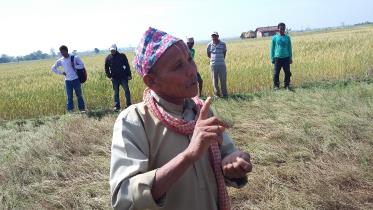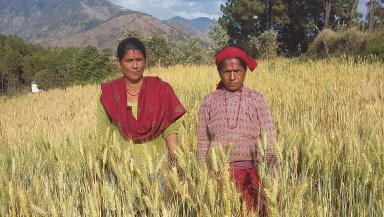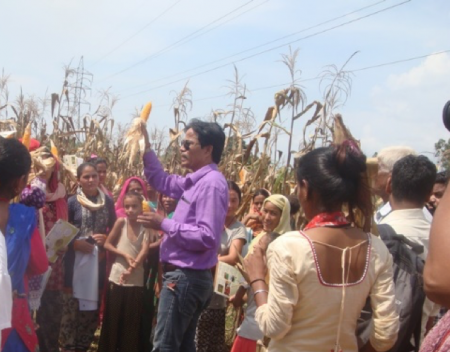
KATHMANDU, NEPAL (CIMMYT) – Farmers in Nepal are benefiting from the work done by the Cereal Systems Initiative of South Asia (CSISA) in Nepal, which promotes public-private partnerships with small and medium enterprises in the seed sector to aid sustainable intensification of wheat- and maize-based cropping systems over the past two years.
Representatives of these enterprises have received business mentoring, participated in an exercise on creating business plans, collaborated with Indian seed companies and attended a “theory of change” workshop. Subsequently, two seed companies (GATE Nepal Pvt. Ltd. and Unique Seed Company) requested technical support from CIMMYT to organize field demonstrations of new wheat and lentil varieties for farmers in six strategic districts in the hills and terai (plains) of Nepal. In terai demonstrations were held in Banke, Bardiya, Kailali and Kanchanpur. In hill districts demonstrations were held in Surkhet and Dadeldhura. Altogether, CIMMYT provided support for 60 wheat and lentil field demonstrations during the 2015-2016 winter season in collaboration with national agriculture research system partners.
A team of professionals, which included representatives from District Agriculture Development Offices (DADOs), Nepal Agriculture Research Council (NARC), CSISA-Nepal, seed companies and the media, attended the demonstrations from 13-17 March 2016. They observed three treatments: a farmers’ variety under farmers’ management; an improved variety under farmers’ management and an improved variety under improved management. The visitors also viewed seed production plots, interacted with farmers about key lessons learned and discussed possible strategies for scaling out wheat and lentil technology through public-private partnerships.
During the visit, it was clear that farmers understood the advantages of growing quality seed of recently released wheat varieties such as Vijay, compared to the local varieties. Some farmers asked for wheat varieties with physical features and cooking qualities similar to those of NL 297, an old variety. At one of the participatory variety selection (PVS) plots, senior wheat breeder Madan Bhatta proposed NARC’s pipeline variety BL4341 as an alternative to NL 297. Milan Paudel, GATE Nepal agriculture officer, became keenly interested in BL4341 and said he would collect seed from the trial plot so his company could multiply it.

The team also observed the wheat field of farmer Ram Chandra Yadav, who had planted Vijay on 3 ha using a zero-tillage seed drill. Yadav is also a local service provider of the zero-tillage seed drill promoted by the CSISA project. During the current wheat season, he has provided paid services on 18 hectares (44.5 acres) belonging to other farmers. The team also witnessed the success of new wheat varieties WK 1204, Dhawalagiri and Danphe in the hill district of Surkhet, where farmers planted a significant area with seed saved from their previous harvest.
Lentils were also in focus, most farmers liked the performance of new variety Black Masuro across districts in the terai. Rabendra Sah, senior technical officer of the National Grain Legume Research Program, said that to get higher yields, farmers should sow Black Masuro by 15 October.
DADO officials acknowledged CIMMYT’s contribution to seed system development and mechanization. They proposed an improved model for producing seed of major food crops in public-private partnerships. In this model, seed companies agree to make contractual arrangements with seed producer groups and cooperatives to produce and market truthfully labeled (TL) seed. Once the contract is signed, DADOs will provide source seed to the seed companies at a subsidized rate, and the seed will be multiplied by producer groups and cooperatives. The TL seed thus produced will then be distributed through different food security related projects.
Given that DADOs from Surkhet and Kanchanpur are keen to participate in this model, CIMMYT has agreed to further strengthen such partnership arrangements. There is a growing realization that the CIMMYT can mobilize private seed companies in Nepal to utilize the network of farmer groups and cooperatives to scale out technologies/varieties.
 Capacity development
Capacity development 

